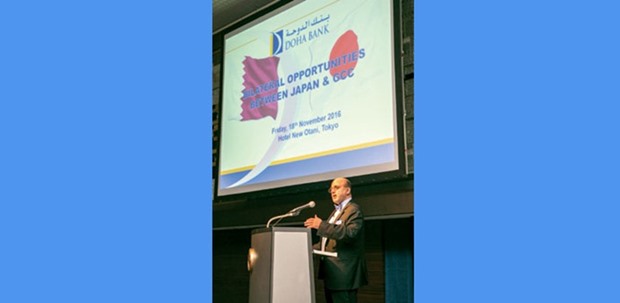Qatar and Japan can synergise relationships in the non-hydrocarbon sector, said Doha Bank CEO Dr R Seetharaman, who noted that bilateral trade between the two countries exceeded $17bn in 2015.
Speaking at the forum “Bilateral Opportunities between Japan and GCC” hosted by Doha Bank in Tokyo, Seetharaman said Japanese companies are broadly engaged in the construction of infrastructure projects in preparation for Qatar’s hosting of the 2022 FIFA World Cup.
He said Japanese construction companies have been awarded contracts in Qatar worth more than $2.1bn in the last 10 years. Seetharaman said in February 2015, Japanese Prime Minister Shinzo Abe and HH the Emir Sheikh Tamim bin Hamad al-Thani attended the signing of a tax treaty and memoranda of cooperation “signifying close friendship of the two countries.”
“The $100mn fund was launched as per a generous initiative by the HH the Father Emir Sheikh Hamad bin Khalifa al-Thani. The fund is supporting several sectors such as fisheries, healthcare, education, technology, scientific research, and entrepreneurship,” Seetharaman said.
He also said Japanese banks drew on close commercial ties to Qatar when they lent funds that helped Doha pay 2015’s down payment for Rafale fighter jets and missiles worth $6.8bn. In September, 2016, Seetharaman said Japan and Qatar agreed to strengthen security relations between the two countries amid tensions in the Middle East.
In early January 2016, Seetharaman said Qatar closed a $5.5bn syndicated loan arranged by six banks, including three Japanese lead lenders. He said Japan Bank for International Cooperation (JBIC) is playing “a vital role” in financing energy-related projects in the region and has a tie-up with Qatar Petroleum since 2008.
Highlighting Qatar’s economy, Seetharaman said health, education, and infrastructure are the major areas in focus this year. Major infrastructure expenditures would include railways, the new Doha Port, several large roadways and the expansion of electricity, water and sewage networks.
“The government came up with $9bn bond issue this year. The government is also taking steps to increase non-oil revenues, focusing on indirect taxes and levies. Qatar has increased stamp duty and plans to levy additional taxes on alcohol, tobacco, and energy drinks starting in 2017. Qatar plans to start applying VAT in 2018. Non-hydrocarbon as a percentage of real GDP will increase from 51.6% in 2016 to 54.4% of real GDP,” he said.
On GCC-Japan bilateral relationships, Seetharaman said: “The value of two-way trade between Japan and the GCC was at $96bn in 2015. Japan is looking into other fields of trade and knowledge exchange, which include food exports from Japan, where manufacturers are increasingly turning towards the production of halal food, as well as cooperation in production of medical devices and in renewable energy.”

Seetharaman speaking at the forum in Tokyo.
